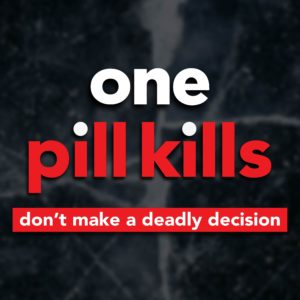HSC launches One Pill Kills Campaign to combat fentanyl
- October 2, 2023
- By: Eric Griffey
- On Campus
Related Links
 A synthetic opioid that’s considered exponentially more addictive than heroin, fentanyl is now the leading cause of death for Americans ages 18 to 49. It can be fatal to ingest even a tiny amount, so small it could fit on a pencil eraser.
A synthetic opioid that’s considered exponentially more addictive than heroin, fentanyl is now the leading cause of death for Americans ages 18 to 49. It can be fatal to ingest even a tiny amount, so small it could fit on a pencil eraser.
In the face of the deadliest epidemic in the history of the U.S., The University of North Texas Health Science Center at Fort Worth is taking a lead role in promoting opioid and fentanyl awareness and prevention by launching its own One Pill Kills campaign. Texas Gov. Greg Abbot announced the state’s $10 million One Pill Kills campaign in April, which included distributing Narcan to every county in the state.
The scope of the university’s efforts includes the creation of a website with helpful resources for anyone who is struggling with addiction, knows someone who is, or wants to get involved with prevention. There also is a list of HSC leaders and faculty experts who have published research related to opioids, addiction or relevant topics; opioid-related stories written about campus stakeholders; and a toolkit with media assets for other organizations that want to replicate HSC’s campaign.
Fentanyl awareness and prevention events
The initiative also will include several events related to opioids and addiction. SaferCare Texas, the university’s patient-safety focused department, will host a free Overcoming Opioids: Awareness and Prevention Event from 1 to 3 p.m. Oct. 12 in Room 109-111 of the HSC Medical Education & Training Building, 1000 Montgomery St.
The event will include training about how to use the life-saving drug Narcan to reverse overdoses and a keynote speech by School of Public Health professor and nationally recognized opioid expert Dr. Scott Walters. It also will include a personal account by We Are Our Brother’s Keeper founder Jessica Castro about losing her son to an overdose, a digital reflection board where attendees can anonymously share their experiences with opioids and addiction, and more. The free event is open to the public but does require registration.
“This initiative represents a line in the sand for SaferCare Texas and for HSC,” said Dr. Teresa Wagner, SaferCare interim director. “Now is the time to act and equip our community with the skills and knowledge to save lives. I couldn’t be prouder of our campus for coming together on such a vital campaign.”
HSC’s School of Biomedical Sciences also will host two addiction expert speakers in October as a part of its Pharmacology & Neuroscience Research Seminar Series. At 11 a.m. Oct 17, Baylor College of Medicine’s Dr. Thomas Kosten will virtually present “Anti-Addiction Vaccines Against Fentanyl and Cocaine.” At 11 a.m. Oct. 24 in Room 524 of HSC’s Everett Education and Administration Building, The Medical University of South Carolina’s Dr. Antonieta Lavin will present “Chronic Methamphetamine Administration Produces Cognitive Deficits Through Augmentation of GABAergic Synaptic Transmission in the Prefrontal Cortex.” Both events are free and open to the public, and neither require registration.
The urgency to act
The timing of HSC’s campaign couldn’t be more urgent. Since 2020, the death toll from fentanyl and other less common synthetic opioids has far exceeded 200,000, according to the Centers for Disease Control and Prevention. This is more than 10 times as many drug deaths as in 1988, the height of the American crack epidemic. More people around the country have died of synthetic-opioid overdoses than the number of U.S. military personnel killed during the Vietnam, Iraq and Afghanistan wars combined.
“HSC’s One Pill Kills campaign speaks to the core of HSC’s role in the community,” said Dr. Sylvia Trent-Adams, HSC president. “The fentanyl epidemic is an issue that spans the entire spectrum of Whole Health. We must reimagine the way we think about opioid and fentanyl awareness and prevention to incorporate all aspects of a potential user’s health, including their mental, financial, environmental health and more. We have an opportunity to save lives, and HSC is ready to lead.”




Social media